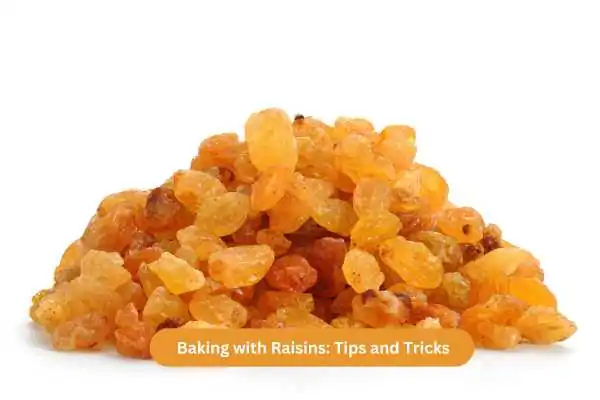Raisins have long been a beloved ingredient in traditional British baking. From comforting teacakes and fruit loaves to scones and sticky buns, these sweet dried grapes bring a rich, chewy texture and natural sweetness to countless recipes. However, using raisins effectively in baking involves more than just tossing them into the mix. With a few expert tips and tricks, you can take your raisin-based baked goods to the next level.

Whether you’re an experienced home baker or just getting started, this guide will help you make the most of raisins in your kitchen.
Why Bake with Raisins?
Raisins are a naturally sweet, nutrient-rich ingredient that add depth of flavour to both sweet and savoury bakes. They pair beautifully with spices like cinnamon and nutmeg, as well as with nuts, apples, and citrus zest. In addition to enhancing taste, raisins also improve texture, offering a pleasant chewiness that contrasts with soft cakes or flaky pastries.
What’s more, raisins are easy to store, readily available across the UK, and a healthier alternative to refined sugar, making them a smart choice for home bakers.
Tip 1: Choose the Right Raisins
Not all raisins are created equal. In the UK, the most commonly available varieties include:
-
Standard raisins – dark and rich, perfect for fruit cakes and puddings.
-
Golden raisins (sultanas) – lighter in colour with a milder flavour; great in scones or light bakes.
-
Currants – small, tart, and ideal for Eccles cakes or rock cakes.
Choose your raisin based on the recipe. For richer bakes, standard raisins provide depth, while golden raisins and currants lend a lighter, fruitier note.
Tip 2: Soak for Better Texture
One of the most important steps in baking with raisins is soaking them before use. This plumps them up, preventing them from drawing moisture out of your batter or dough. Dried raisins can become hard or rubbery if baked straight from the packet.
To soak raisins:
-
Place them in a bowl and cover with warm water, fruit juice, or even brewed tea.
-
Let them soak for 10–20 minutes, then drain and pat dry with a paper towel.
For a flavour boost, try soaking raisins in spiced tea, rum, or brandy—a popular technique in traditional British Christmas baking.
Tip 3: Coat in Flour to Prevent Sinking
Raisins can sometimes sink to the bottom of a cake during baking, especially in thinner batters. To avoid this, toss your soaked and dried raisins in a spoonful of flour before folding them into the mixture. The flour coating helps them stay suspended throughout the bake, ensuring even distribution.
This trick works particularly well in recipes like fruit cakes, tea loaves, and muffins.
Tip 4: Combine with Complementary Flavours
Raisins work well with a variety of complementary ingredients. When used thoughtfully, they can elevate a simple bake into something special. Here are some classic flavour pairings:
-
Cinnamon and nutmeg – ideal in spiced cakes or buns.
-
Lemon or orange zest – adds brightness to scones or tea cakes.
-
Walnuts or pecans – provide crunch and depth in cookies or loaf cakes.
-
Apples or pears – create a soft, fruity contrast in tarts or muffins.
Experiment with different combinations to find your favourites.
Tip 5: Use in Dough-Based Bakes
Raisins are excellent in dough-based recipes such as hot cross buns, Chelsea buns, and cinnamon rolls. The key is to add them after the first knead but before the final rise. This ensures the raisins stay intact and don’t break down during the mixing process.
In enriched doughs, balance is important—too many raisins can make shaping difficult, while too few can leave your bake underwhelming. Aim for an even spread without crowding.
Tip 6: Store Raisin Bakes Properly
Raisin-laden baked goods can dry out quickly if not stored properly. Once cooled, wrap them tightly in cling film or store in an airtight container. For longer shelf life, especially in the case of fruit cakes or loaf cakes, you can brush the surface with a sugar syrup or a small amount of brandy before storing.
Most raisin bakes keep well for 2–5 days at room temperature or up to a week in the fridge. Some, like rich fruit cakes, improve over time when stored in a cool, dark place.
Common Mistakes to Avoid
-
Using old raisins: Stale raisins can be tough and lack flavour. Use fresh, moist ones for the best results.
-
Skipping the soak: Dry raisins can ruin the texture of your bake.
-
Overloading your mix: Too many raisins can weigh down cakes or cause uneven baking.
Final Thoughts
Raisins are a versatile, flavourful ingredient that can bring warmth, sweetness, and tradition to your baking. By choosing the right variety, soaking them properly, and pairing them with complementary flavours, you’ll be able to create bakes that are not only delicious but beautifully textured and balanced.
So next time you’re planning a baking session in your UK kitchen, don’t overlook the humble raisin. With a few thoughtful tweaks and expert tips, they might just become your new favourite baking companion.

